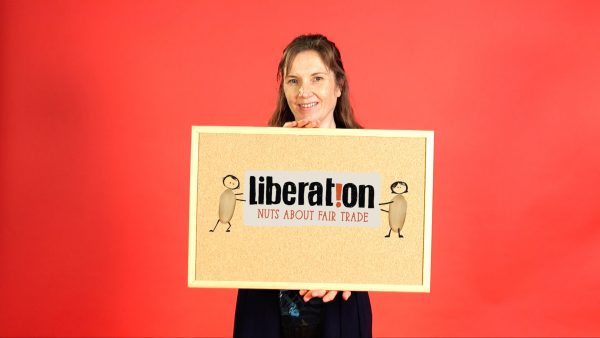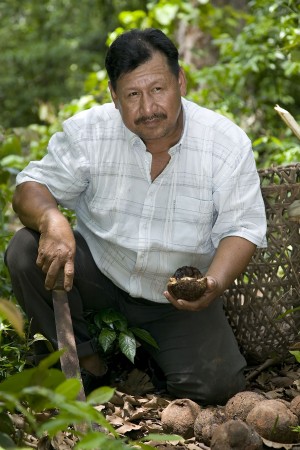One of the biggest Fairtrade success stories in recent years is Liberation Foods, which celebrates its 10th anniversary in 2017.
It was founded by Twin – the Fairtrade charity famed for setting up Cafedirect and Divine Chocolate.
In 2003, the organisation brought together global nut producers from Bolivia, El Salvador, India, Malawi and Nicaragua to develop the first ever Fairtrade standards for nuts.
The first certified consignment arrived in the UK in 2005 and two years later, Liberation Foods was launched. The world’s first farmer-owned ethical nut business, it was backed by the International Nut Cooperative (INC), representing 22,000 farmers across Asia, Africa and Central America.
Liberation Foods is a community interest company – 44% of which is owned by the nut producer co-ops in the INC. Any profits and dividends go back to them and are invested in tools, equipment and community projects such as health care and education facilities.
Twin owns a 23% share, with the rest held by other ethical investors including Cordaid and Equal Exchange.
Ten years on from the launch of Liberation Foods, managing director Kate Gaskell is proud of the progress made, with a current turnover of over £4m and more than 500 tonnes of nuts produced and packaged for the UK and Europe every year.
https://www.youtube.com/watch?v=QAH6_AzWRPA
“We were the first to introduce Fairtrade nuts to the market,” she says, “and we now supply retailers like Tesco, Sainsbury’s and Waitrose as well as Oxfam, Traidcraft and other ethical outlets.
“Every kilo we sell is very valuable to small-scale producers and gatherers. The market continues to increase and we are very optimistic about its future.
“It is very much in the current zeitgeist of replacing less healthy snacks like chocolate and crisps. People are realising nuts are a very sustainable kind of protein which can be very valuable in their diet.”
Related: Co-ops react to Cadbury’s Fairtrade logo swap
Since the launch, the producer/shareholder ownership ratio has increased, she says, rising from a third to 44%.
“We continue to work with our producer representatives,” she adds, “and each organisation has very different strengths and characteristics.
“For example, in Kerala where our cashews are produced there is a fantastic focus on women’s roles. They have set up community credit schemes managed by women who 10 years ago did not handle money.
“They have been empowered and liberated by getting together to share issues and collaborate on ideas like growing different crops and becoming more self-sufficient. The whole concept of organic farming was under threat and Fairtrade business put energy into it.”
Kate trained as a food technologist and her first job was in the desserts department at M&S.

“I have always worked in the industry and I had a deep-rooted desire to make some contribution to redressing the awful imbalance in power and wealth between ‘developed’ and ‘developing’ countries,” she says.
“I did a voluntary stint in Belize and it was there I came across the beginning of Fairtrade with cocoa producers for Green & Black’s. That inspired me to work in the Fairtrade sector and I got a job at Twin in 2004.
“I worked setting up Liberation Foods and became MD in 2010. We have an eight-strong team and because we care we are very mission-driven, we exist to represent our producers.
“My role is challenging, fun and varied; it ranges from negotiating with Tesco, to visiting producers from Bolivia to Malawi.”
Related: Revolver launches new coffee products
Liberation Foods is at the forefront of several global training programmes, carried out in partnership with Twin. These include fair rewards and recognition for women, and promoting best practice in quality standards, land use, planting and water conservation.
And the company has expanded its range to include peanut butter and chasing the growing market for healthy convenience food with ‘smart snacks’ incorporating dried fruit and chocolate with a variety of nuts.
“We are on an upwards trajectory and we are very proud of our range which is good for the producer, the consumer and easy on the environment,” says Kate.
Another Liberation Foods initiative is National Nut Day; held every October, it started in the US and was introduced to the UK in 2010.
“That and Fairtrade Fortnight are our two lynchpin events and very important in raising awareness and communicating our theme of liberating lives and the impact we can have on producer communities,” adds Kate.

“We do that in a variety of ways including social media, cartoons and animations and also films of producers in places like Bolivia. It is all about our mission to bring nut producers together with consumers and show them as ordinary people trying to make a living with good products.
“Fairtrade Fortnight gives us an opportunity to raise sales and awareness among the mainstream population and our retailers are pretty supportive.”
She says Liberation Foods is now in talks with the Co-op Group and hopes to see its products on sale there “in the very near future”.
“At last year’s AGM there was a specific request from members for a wider range of Fairtrade goods and we hope to be a part of that,” she adds.
“In the future I hope to see our nuts getting the recognition they deserve as a sustainable healthy nutritional snack, with the vast majority supplied by Fairtrade producers. Much of the production is done at origin or owned by community so it is end-to-end sustainable food production.”
And she has high hopes for the future of the venture.
“In 10 years’ time I would love to see us with a turnover of £10m,” she says, “having converted more UK consumers to the virtues of healthy, environmentally friendly Fairtrade nut consumption – and, in the process, sustained and empowered nut-producing communities and families in Bolivia, El Salvador, India, Malawi and Nicaragua.
“Our vision is a world in which smallholder farmers can enjoy secure, sustainable livelihoods and plan for the future. Our mission is to bring nut producers and consumers together so that everyone gets a better deal.”